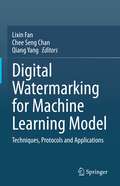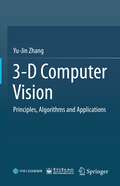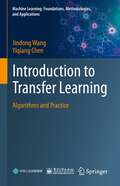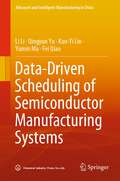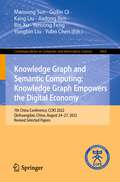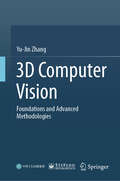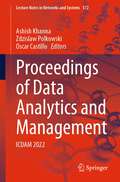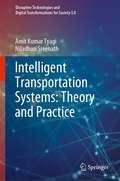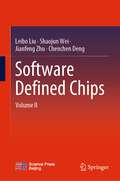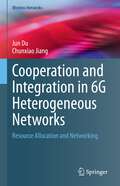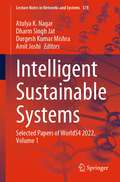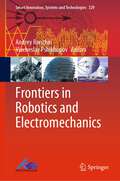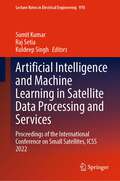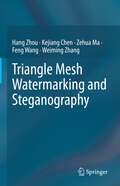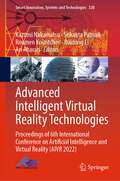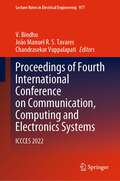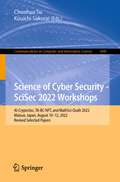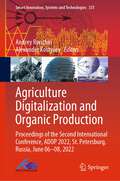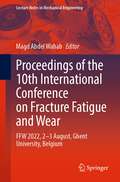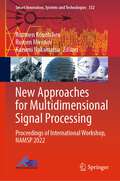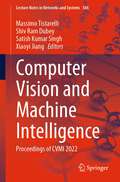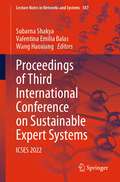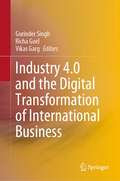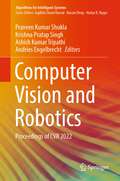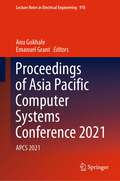- Table View
- List View
Digital Watermarking for Machine Learning Model: Techniques, Protocols and Applications
by Lixin Fan Chee Seng Chan Qiang YangMachine learning (ML) models, especially large pretrained deep learning (DL) models, are of high economic value and must be properly protected with regard to intellectual property rights (IPR). Model watermarking methods are proposed to embed watermarks into the target model, so that, in the event it is stolen, the model’s owner can extract the pre-defined watermarks to assert ownership. Model watermarking methods adopt frequently used techniques like backdoor training, multi-task learning, decision boundary analysis etc. to generate secret conditions that constitute model watermarks or fingerprints only known to model owners. These methods have little or no effect on model performance, which makes them applicable to a wide variety of contexts. In terms of robustness, embedded watermarks must be robustly detectable against varying adversarial attacks that attempt to remove the watermarks. The efficacy of model watermarking methods is showcased in diverse applications including image classification, image generation, image captions, natural language processing and reinforcement learning. This book covers the motivations, fundamentals, techniques and protocols for protecting ML models using watermarking. Furthermore, it showcases cutting-edge work in e.g. model watermarking, signature and passport embedding and their use cases in distributed federated learning settings.
3-D Computer Vision: Principles, Algorithms and Applications
by Yu-Jin ZhangThis textbook offers advanced content on computer vision (basic content can be found in its prerequisite textbook, “2D Computer Vision: Principles, Algorithms and Applications”), including the basic principles, typical methods and practical techniques. It is intended for graduate courses on related topics, e.g. Computer Vision, 3-D Computer Vision, Graphics, Artificial Intelligence, etc. The book is mainly based on my lecture notes for several undergraduate and graduate classes I have offered over the past several years, while a number of topics stem from my research publications co-authored with my students. This book takes into account the needs of learners with various professional backgrounds, as well as those of self-learners. Furthermore, it can be used as a reference guide for practitioners and professionals in related fields. To aid in comprehension, the book includes a wealth of self-test questions (with hints and answers). On the one hand, these questions help teachers to carry out online teaching and interact with students during lectures; on the other, self-learners can use them to assess whether they have grasped the key content.
Introduction to Transfer Learning: Algorithms and Practice (Machine Learning: Foundations, Methodologies, and Applications)
by Jindong Wang Yiqiang ChenTransfer learning is one of the most important technologies in the era of artificial intelligence and deep learning. It seeks to leverage existing knowledge by transferring it to another, new domain. Over the years, a number of relevant topics have attracted the interest of the research and application community: transfer learning, pre-training and fine-tuning, domain adaptation, domain generalization, and meta-learning. This book offers a comprehensive tutorial on an overview of transfer learning, introducing new researchers in this area to both classic and more recent algorithms. Most importantly, it takes a “student’s” perspective to introduce all the concepts, theories, algorithms, and applications, allowing readers to quickly and easily enter this area. Accompanying the book, detailed code implementations are provided to better illustrate the core ideas of several important algorithms, presenting good examples for practice.
Data-Driven Scheduling of Semiconductor Manufacturing Systems (Advanced and Intelligent Manufacturing in China)
by Li Li Qingyun Yu Kuo-Yi Lin Yumin Ma Fei QiaoThis book systematically discusses the intelligent scheduling problem of complex semiconductor manufacturing systems from theory to method and then to application. The main contents include data-driven scheduling framework of semiconductor manufacturing system, data preprocessing of semiconductor manufacturing system, correlation analysis of performance index of semiconductor production line, intelligent release control strategy, dynamic dispatching rules simulating pheromone mechanism, and load balancing dynamic scheduling of semiconductor production line, performance index-driven dynamic scheduling method of semiconductor production line, scheduling trend of semi-conductor manufacturing system in big data environment.This book aims to provide readers with valuable reference and assistance in the theoretical methods, techniques, and application cases of semiconductor manufacturing systems and their intelligent scheduling.
Knowledge Graph and Semantic Computing: 7th China Conference, CCKS 2022, Qinhuangdao, China, August 24–27, 2022, Revised Selected Papers (Communications in Computer and Information Science #1669)
by Maosong Sun Guilin Qi Kang Liu Jiadong Ren Bin Xu Yansong Feng Yongbin Liu Yubo ChenThis book constitutes the refereed proceedings of the 7th China Conference on Knowledge Graph and Semantic Computing: Knowledge Graph Empowers the Digital Economy, CCKS 2022, in Qinhuangdao, China, August 24–27, 2022.The 15 full papers and 2 short papers included in this book were carefully reviewed and selected from 100 submissions. They were organized in topical sections as follows: knowledge representation and reasoning; knowledge acquisition and knowledge base construction; linked data, knowledge integration, and knowledge graph storage managements; natural language understanding and semantic computing; knowledge graph applications; and knowledge graph open resources.
3D Computer Vision: Foundations and Advanced Methodologies
by Yu-Jin ZhangThis book offers a comprehensive and unbiased introduction to 3D Computer Vision, ranging from its foundations and essential principles to advanced methodologies and technologies. Divided into 11 chapters, it covers the main workflow of 3D computer vision as follows: camera imaging and calibration models; various modes and means of 3D image acquisition; binocular, trinocular and multi-ocular stereo vision matching techniques; monocular single-image and multi-image scene restoration methods; point cloud data processing and modeling; simultaneous location and mapping; generalized image and scene matching; and understanding spatial-temporal behavior. Each topic is addressed in a uniform manner: the dedicated chapter first covers the essential concepts and basic principles before presenting a selection of typical, specific methods and practical techniques. In turn, it introduces readers to the most important recent developments, especially in the last three years. This approachallows them to quickly familiarize themselves with the subject, implement the techniques discussed, and design or improve their own methods for specific applications. The book can be used as a textbook for graduate courses in computer science, computer engineering, electrical engineering, data science, and related subjects. It also offers a valuable reference guide for researchers and practitioners alike.
Proceedings of Data Analytics and Management: ICDAM 2022 (Lecture Notes in Networks and Systems #572)
by Ashish Khanna Zdzislaw Polkowski Oscar CastilloThis book includes original unpublished contributions presented at the International Conference on Data Analytics and Management (ICDAM 2022), held at tThe Karkonosze University of Applied Sciences, Poland, during June 2022. The book covers the topics in data analytics, data management, big data, computational intelligence, and communication networks. The book presents innovative work by leading academics, researchers, and experts from industry which is useful for young researchers and students.
Intelligent Transportation Systems: Theory and Practice (Disruptive Technologies and Digital Transformations for Society 5.0)
by Amit Kumar Tyagi Niladhuri SreenathThis book provides fundamental principles of intelligent transport systems with comprehensive insight and state of the art of vehicles, vehicular technology, connecting vehicles, and intelligent vehicles/autonomous intelligent vehicles. The book discusses different approaches for multiple sensor-based multiple-objects tracking, in addition to blockchain-based solutions for building tamper-proof sensing devices. It introduces various algorithms for security, privacy, and trust for intelligent vehicles. This book countermeasures all the drawbacks and provides useful information to students, researchers, and scientific communities. It contains chapters from national and international experts and will be essential for researchers and advanced students from academia, and industry experts who are working on intelligent transportation systems.
Software Defined Chips: Volume II
by Leibo Liu Shaojun Wei Jianfeng Zhu Chenchen DengThis book is the second volume of a two-volume book set which introduces software-defined chips. In this book, the programming model of the software-defined chips is analyzed by tracing the coevolution of modern general-purpose processors and programming models. The enhancement in hardware security and reliability of the software-defined chips are described from the perspective of dynamic and partial reconfiguration. The challenges and prospective trends of software-defined chips are also discussed. Current applications in the fields of artificial intelligence, cryptography, 5G communications, etc., are presented in detail. Potential applications in the future, including post-quantum cryptography, evolutionary computing, etc., are also discussed. This book is suitable for scientists and researchers in the areas of electrical and electronic engineering and computer science. Postgraduate students, practitioners and professionals in related areas are also potentially interested in the topic of this book.
Cooperation and Integration in 6G Heterogeneous Networks: Resource Allocation and Networking (Wireless Networks)
by Jun Du Chunxiao JiangTo provide ubiquitous and various services, 6G networks tend to be more comprehensive and multidimensional by integrating current terrestrial networks with space-/air-based information networks and marine information networks; then, heterogeneous network resources, as well as different types of users and data, will be also integrated. Driven by the exponentially growing demands of multimedia data traffic and computation-heavy applications, 6G heterogenous networks are expected to achieve a high QoS with ultra-reliability and low latency. In response, resource allocation has been considered an important factor that can improve 6G performance directly by configuring heterogeneous communication, computing and caching resources effectively and efficiently. The book addresses a range of technical issues in cooperative resource allocation and information sharing for the future 6G heterogenous networks, from the terrestrial ultra-dense networks and space-based networks to the integrated satellite-terrestrial networks, as well as introducing the effects of cooperative behavior among mobile users on increasing capacity, trustworthiness and privacy. For the cooperative transmission in heterogeneous networks, the authors commence with the traffic offloading problems in terrestrial ultra-dense networks, and the cognitive and cooperative mechanisms in heterogeneous space-based networks, the stability analysis of which is also provided. Moreover, for the cooperative transmission in integrated satellite-terrestrial networks, the authors present a pair of dynamic and adaptive resource allocation strategies for traffic offloading, cooperative beamforming and traffic prediction based cooperative transmission. Later, the authors discuss the cooperative computation and caching resource allocation in heterogeneous networks, with the highlight of providing our current studies on the game theory, auction theory and deep reinforcement learning based approaches. Meanwhile, the authors introduce the cooperative resource and information sharing among users, in which capacity oriented-, trustworthiness oriented-, and privacy oriented cooperative mechanisms are investigated. Finally, the conclusion is drawn.
Intelligent Sustainable Systems: Selected Papers of WorldS4 2022, Volume 1 (Lecture Notes in Networks and Systems #578)
by Atulya K. Nagar Dharm Singh Jat Durgesh Kumar Mishra Amit JoshiThis book provides insights of World Conference on Smart Trends in Systems, Security and Sustainability (WS4 2022) which is divided into different sections such as Smart IT Infrastructure for Sustainable Society; Smart Management Prospective for Sustainable Society; Smart Secure Systems for Next Generation Technologies; Smart Trends for Computational Graphics and Image Modeling; and Smart Trends for Biomedical and Health Informatics. The proceedings is presented in two volumes. The book is helpful for active researchers and practitioners in the field.
Frontiers in Robotics and Electromechanics (Smart Innovation, Systems and Technologies #329)
by Andrey Ronzhin Viacheslav PshikhopovThis book introduces intellectual control systems and electromechanics of heterogeneous robots. The book uncovers fundamental principles of robot control and recent developments in software and hardware of robots. The book presents solutions and discusses problems of single robotic devices as well as heterogeneous robotic teams while performing technological tasks that require informational, physical or energetic interaction with human users, environment and other robots. The book considers model–algorithmic and software–hardware control of ground, water and underwater robots, unmanned aerial vehicles, as well as their embedded and attached sub-systems, including manipulators, end-effectors, sensors, actuators, etc. The book will be useful for researchers of interdisciplinary issues related to robotics, electromechanics and artificial intelligence. The book is recommended for graduate students with a major/minor in the areas of robotics and mechatronics, management in technical systems, Internet of Things, artificial intelligence, electrical engineering, mechanical engineering and computer science.
Artificial Intelligence and Machine Learning in Satellite Data Processing and Services: Proceedings of the International Conference on Small Satellites, ICSS 2022 (Lecture Notes in Electrical Engineering #970)
by Sumit Kumar Kuldeep Singh Raj SetiaThis book, Artificial Intelligence and Machine Learning in Satellite: Data Processing and Services, presents the selected proceedings of the International Conference on Small Satellites (ICSS 2022) that aims to provide an opportunity for academicians, scientists, researchers, and industry experts, engaged in teaching, research, and development on satellite data processing and its services by employing advanced artificial intelligence-based machine learning techniques. This book covers the application of artificial intelligence and machine learning techniques in various domains of earth observations like natural resources and environmental management, water resources, urban and rural development, climate change, and other contemporary subjects. The book will surely be a valuable asset for beginners, researchers, and professionals working in satellite data processing and services using artificial intelligence and machine learning approaches.
Triangle Mesh Watermarking and Steganography
by Hang Zhou Kejiang Chen Zehua Ma Feng Wang Weiming ZhangThis book provides a systematic overview of watermarking and steganography methods for triangle meshes related to computer graphics and security. The significance of this research has been well recognized by the growing body of work on watermarking, steganography and steganalysis of 3D meshes. With the evolution of the CAD industry and real-world end-user applications such as virtual reality (VR) and 3D printing, 3D meshes have attracted world-wide attention. Besides, the flexible data structure of 3D geometry provides enough space to embed secret information, making it ideal for applications such as copyright protection and covert communication. Our goal of the book is to allow readers to systematically understand 3D mesh information hiding technology and its applications as a whole. The book outlines comprehensive techniques, including handcrafted and deep learning-based techniques, digital and physical techniques in the literature and provides standard evaluation metrics for triangle meshes. The up-to-date geometrical deep learning and 3D printing-related algorithms are also covered. Offering a rich blend of ideas and algorithms, the book is up-to-date and self-contained. It is an excellent reference resource for users who are seeking 3D mesh watermarking and steganography algorithms, as well as for graduate students and researchers wanting to grasp the frontiers of triangular mesh processing on data hiding.
Advanced Intelligent Virtual Reality Technologies: Proceedings of 6th International Conference on Artificial Intelligence and Virtual Reality (AIVR 2022) (Smart Innovation, Systems and Technologies #330)
by Kazumi Nakamatsu Srikanta Patnaik Roumen Kountchev Ruidong Li Ari AharariThis book gathers a collection of selected works and new research results of scholars and graduate students presented at the 6th International Conference on Artificial Intelligence and Virtual Reality (AIVR 2022) via the Internet, during July 22-24 2022, hosted and organized by Sojo University in conjunction with other three universities and Beijing Huaxia Rongzhi Blockchain Technology Institute. The focus of the book is interdisciplinary in nature and includes research on all aspects of artificial intelligence and virtual reality, from fundamental development to the applied system. The book covers topics such as system techniques, performance, and implementation; content creation and modelling; cognitive aspects, perception, user behaviour; AI technologies; interactions, interactive and responsive environments; AI/VR applications and case studies.
Proceedings of Fourth International Conference on Communication, Computing and Electronics Systems: ICCCES 2022 (Lecture Notes in Electrical Engineering #977)
by V. Bindhu João Manuel R. S. Tavares Chandrasekar VuppalapatiThis book includes high-quality research papers presented at the Fourth International Conference on Communication, Computing and Electronics Systems (ICCCES 2022), held at the PPG Institute of Technology, Coimbatore, India, on September 15–16, 2022. The book focuses mainly on the research trends in cloud computing, mobile computing, artificial intelligence and advanced electronics systems. The topics covered are automation, VLSI, embedded systems, optical communication, RF communication, microwave engineering, artificial intelligence, deep learning, pattern recognition, communication networks, Internet of things, cyber-physical systems and healthcare informatics.
Science of Cyber Security - SciSec 2022 Workshops: AI-CryptoSec, TA-BC-NFT, and MathSci-Qsafe 2022, Matsue, Japan, August 10–12, 2022, Revised Selected Papers (Communications in Computer and Information Science #1680)
by Chunhua Su Kouichi SakuraiThis volume constitutes the papers of several workshops which were held in conjunction with the 4th International Conference on Science of Cyber Security Workshops, SciSec 2022, held in Matsue, Japan, in August 10–12, 2022. The 15 revised full papers and 3 posters were presented in this book were carefully reviewed and selected from 30 submissions.They were organized in topical sections as follows: AI Crypto and Security Workshop (AI-CryptoSec); Theory and Application of Blockchain and NFT Workshop (TA-BC-NFT); and Mathematical Science of Quantum Safety and its Application Workshop (MathSci-Qsafe).
Agriculture Digitalization and Organic Production: Proceedings of the Second International Conference, ADOP 2022, St. Petersburg, Russia, June 06–08, 2022 (Smart Innovation, Systems and Technologies #331)
by Andrey Ronzhin Alexander KostyaevThis book includes selected papers from the Second International Conference on Agriculture Digitalization and Organic Production (ADOP 2022), held in St. Petersburg, Russia, during June 06–08, 2022. The topics covered in the book are ground robotic systems in crop production, unmanned aerial vehicles in crop production, aerospace monitoring tools in crop production, robotic animal husbandry, digitalization of technological processes of agricultural production, evaluation of the effectiveness of digital technologies for the production of organic products, rational nature management and ecology in agricultural production, technologies for the production of organic agricultural products, market analysis of organic agricultural products, and legal aspects of organic production.
Proceedings of the 10th International Conference on Fracture Fatigue and Wear: FFW 2022, 2-3 August, Ghent University, Belgium (Lecture Notes in Mechanical Engineering)
by Magd Abdel WahabThis book gathers a selection of peer-reviewed papers presented at the 10th International Conference on Fracture Fatigue and Wear (FFW 2022), held in the city of Ghent, Belgium, on August 2–3, 2022. The contributions, prepared by international scientists and engineers, cover the latest advances in and innovative applications of fracture mechanics, fatigue of materials, tribology, and wear of materials. In addition, they discuss industrial applications and cover theoretical and analytical methods, numerical simulations, and experimental techniques. The book is intended for academics, including graduate students and researchers, as well as industrial practitioners working in the areas of fracture fatigue and wear.
New Approaches for Multidimensional Signal Processing: Proceedings of International Workshop, NAMSP 2022 (Smart Innovation, Systems and Technologies #332)
by Roumen Kountchev Rumen Mironov Kazumi NakamatsuThis book is a collection of papers presented at the International Workshop on New Approaches for Multidimensional Signal Processing (NAMSP 2022), held at Technical University of Sofia, Sofia, Bulgaria, during 23–25 June 2022. The book covers research papers in the field of N-dimensional multicomponent image processing, multidimensional image representation and super-resolution, 3D image processing and reconstruction, MD computer vision systems, multidimensional multimedia systems, neural networks for MD image processing, data-based MD image retrieval and knowledge data mining, watermarking, hiding and encryption of MD images, MD image processing in robot systems, tensor-based data processing, 3D and multi-view visualization, forensic analysis systems for MD images and many more.
Computer Vision and Machine Intelligence: Proceedings of CVMI 2022 (Lecture Notes in Networks and Systems #586)
by Massimo Tistarelli Shiv Ram Dubey Satish Kumar Singh Xiaoyi JiangThis book presents selected research papers on current developments in the fields of computer vision and machine intelligence from International Conference on Computer Vision and Machine Intelligence (CVMI 2022). The book covers topics in image processing, artificial intelligence, machine learning, deep learning, computer vision, machine intelligence, etc. The book is useful for researchers, postgraduate and undergraduate students, and professionals working in this domain.
Proceedings of Third International Conference on Sustainable Expert Systems: ICSES 2022 (Lecture Notes in Networks and Systems #587)
by Subarna Shakya Valentina Emilia Balas Wang HaoxiangThis book features high-quality research papers presented at the 3rd International Conference on Sustainable Expert Systems (ICSES 2022), held in Nepal during September 9–10, 2022. The book focuses on the research information related to artificial intelligence, sustainability and expert systems applied in almost all the areas of industries, government sectors and educational institutions worldwide. The main thrust of the book is to publish the conference papers that deal with the design, implementation, development, testing and management of intelligent and sustainable expert systems and also to provide both theoretical and practical guidelines for the deployment of these systems.
Industry 4.0 and the Digital Transformation of International Business
by Gurinder Singh Richa Goel Vikas GargThe book throws light on the ongoing trends in international business, integration of information technology with global businesses, its role in value co-creation, resource integration, and service for service exchange. While discussing the issues of these areas, chapters of this book also delve into prevalent problematic areas which are closely related like employment, ethical aspects, power creation, and so on. Recognizing the role digitization and new technologies play in enabling global managers to communicate with outside world directly via digital channels irrespective of their location (which is especially true in time of COVID-19), the book takes an emerging economy perspective and throws light on new theories, perceptions, employment opportunities, and innovative ideas through its content. The book not only discusses effects of information technology but also the latest emerging technology in global business like use of artificial intelligence, robotics, machine learning, big data, and their integration with the global business 4.0. Since emergence of these new technologies requires proper infrastructural development, the book also throws light on government initiatives and CSR in this respect. It contains takeaways for both undergraduate and graduate students, researchers and academicians, industry watchers, practitioners, start-ups, and entrepreneurs
Computer Vision and Robotics: Proceedings of CVR 2022 (Algorithms for Intelligent Systems)
by Praveen Kumar Shukla Krishna Pratap Singh Ashish Kumar Tripathi Andries EngelbrechtThis book is a collection of the high-quality research articles in the field of computer vision and robotics which are presented in International Conference on Computer Vision and Robotics (ICCVR 2022), organized by BBD University Lucknow India, during 21 – 22 May 2022. The book discusses applications of computer vision and robotics in the fields like medical science, defence and smart city planning. This book presents recent works from researchers, academicians, industry, and policy makers.
Proceedings of Asia Pacific Computer Systems Conference 2021: APCS 2021 (Lecture Notes in Electrical Engineering #978)
by Anu Gokhale Emanuel GrantThis book contains select proceedings papers from the Asia Pacific Computer Systems Conference (APCS 2022). The contents focus on the design and implementation of languages, data models, process models, algorithms, software and hardware for information systems. The chapters also include contributions on data mining and knowledge discovery addressing detailed descriptions of significant applications. This book proves a valuable resource for those in academia and industry interested in computational intelligence, artificial intelligence and automation.
